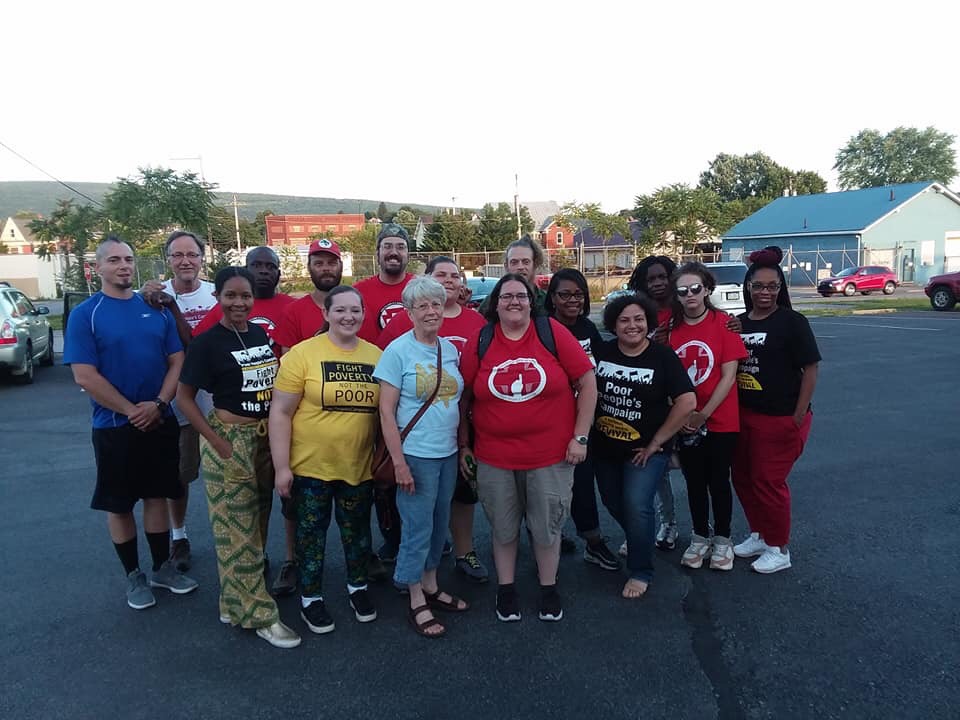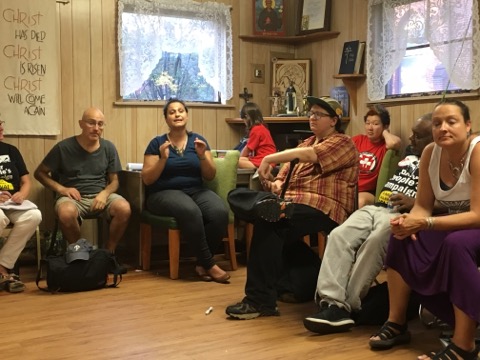
From July 12 through July 15, 2019, Put People First! Pennsylvania (PPF-PA) and the Popular Education Project (PEP) hosted a movement leaders exchange in Pennsylvania. The exchange was the first of what organizers and participants hope will be many more. It brought together leaders from Vermont, Massachusetts, Kansas, Alabama, Louisiana, New York and Texas. There were many different struggles and organizations represented, but most were tied together through their connection to the Poor People’s Campaign: A National Call for Moral Revival and by their commitment to building a movement across lines of division to end the systemic causes of injustice in our nation and world.
The exchange began in Harrisburg, PA and then fanned out across the state into different regions where PPF-PA is organizing. I went with a group to Lancaster and York counties, the south central part of PA. In each region local PPF leaders orientated us to the history and organizing that they are part of and took us out to canvass in the neighborhoods where the poor and dispossessed live.
We were only together for a few days, but in that time we deepened our understanding of the local conditions and struggle in PA, re-enforced and re-energized our belief in a movement that will unite us across difference, and formed personal bonds of solidarity and friendship. As one of the members of my group said to our PPF hosts toward the end of our time together, “stop calling us your visitors, we’re family.”
The exchange was encouraging and reinforced the need for more of this type of education and relationship building. Many participants proposed that we organize the next exchange in the South. As we continue to build this movement, our victory depends on our ability to be clear about what defines the times we live in and what is distinct about how we must fight.
Nijmie Dzurinko, who helped to found PPF-PA and is also a member of the Poor People’s Campaign’s National Steering Committee, wrote the following essay about PPF’s organizing model as it applies to PA. Although this text was written a few years ago (2016), it remains a very clear description of both what we are up against and how we must organize ourselves to win. —Adam Barnes
Considerations for Building a Statewide Movement in Pennsylvania
by Nijmie Dzurinko
Who’s important?
Who’s important in Pennsylvania? Where is it important to build? Prevailing wisdom among liberal and progressive organizing in the state marks off a handful of counties that “matter”, that are “worth being in”. These are counties in the Southeast part of the state (Philadelphia and the collar counties – Bucks, Chester, Delaware, Montgomery), the Lehigh Valley (Allentown, Lehigh, and sometimes Berks), Allegheny County (where Pittsburgh is) and sometimes York and Dauphin are thrown in for good measure. The significance of these counties is that they are where population is growing as opposed to declining. These counties have the most people of color and people who are part of the “new American majority” (people of color, women, youth, immigrants). Other regions of the state (older, whiter) are not considered as important. The implication is that these other regions are not the “most directly impacted”. However, if you scratch beneath the surface of this framework what you will see is that it is thinly veiled partisan politicking. It’s simply a matter of who are the most reliable voters for either major political party. Therefore, liberal and progressive groups which are most interested in shoring up votes for Democrats will focus on particular areas and cut their losses elsewhere. The same applies for the Republican party.
We decide that the poor and dispossessed are important — of every color, every background, every gender, every age, every religion, every ability, every political persuasion.
But where is the most strategic for us to focus? Do we base our calculations in the same way that the Democratic party does? I assert that to do so would be at our own peril. It would render us obsolete as an independent political force in Pennsylvania. For us, there is no Philadelphia without Fayette County. There is no center of capital without the many peripheries that surround it. It is essential to understand this fundamental relationship between the center and the periphery and not be distracted and satisfied with the surface level appearance of things.
The surface level says: more people, more happening (more capital), good. Less people, less happening (less capital), bad. This is the frame that the powers that be have given us. The reality is that every locality in the state has to compete with every other locality, for tax revenue, for capitalist investment, for jobs. We cannot fall victim to the illusions of “good” and “bad” places, “good” and “bad” people which map so neatly onto places where there is capital, ie “value”. There can be no real leadership of people that doesn’t understand this fundamental dynamic. So who is important to us? How do we decide who’s important if not by virtue of categories that others use? We decide that the poor and dispossessed are important – of every color, every background, every gender, every age, every religion, every ability, every political persuasion. We unite with them, we ally with them, we go to where they are. We unite them.

Organize All Manner of People
The terrain on which we are living is oppressive and it has real material consequences in people’s lives. We all carry the burden of the internalization of the ideologies that accompany and reinforce that oppression. One of the distortions of our time is the belief that you can equate the isolated statement of a person with a fundamental truth about who that person is. This is a false position and an elitist one. By virtue of educational and/or socio-economic privilege, some have gone through lots of training in speaking and writing. Our leaders and strategists must be able to distinguish between appearance and reality. Does a sentence or phrase that comes out the wrong way cancel out a lifetime of material struggle? Does it cancel out the sum total of someone’s experiences? Is it an exercise in the same level of power as a Governor who knowingly pollutes the water supply of tens of thousands, or capitalists and elected officials who conspire together to remake a neighborhood or a town as a playground for the rich? Why then do we feel justified to consistently react with even more outrage to verbal incidents from people with little or no structural power?
One of the distortions of our times is the belief that you can equate the isolated statement of a person with a fundamental truth about who that person is.
Should we be vetting the people that we’re organizing according to their language? Absolutely not. It is only relationally that we can influence them. We have to create our own language and our own approach to dealing with oppression. We’re not throwing out poor and dispossessed people – of all backgrounds – because they carry isms and phobias. Just as people can internalize those habits they can be replaced with solidarity. We’ve seen that shift happen. We want a society without police and prisons yet we criminalize and symbolically lock up people and throw away the key because of their language. We deem them unworthy, we banish them. And some of them are some of the kindest and most loyal friends you could ever imagine. On the other hand, there are some downright horrible people with “good” or even “great” politics. They know everything about gender pronouns, they would never say “all lives matter”, they know what’s current, they know what you’re supposed to know when you’re in the know. They are in the very middle of the echo chamber of “progressives”. Yet they act horribly. They’re backstabbers. They’ll throw you under the bus at a moment’s notice. They don’t listen. They don’t even care. They just know the right things to say. This is not the basis on which to organize people or the basis on which to build a movement.
Visible and Invisible Violence
There is a hegemonic form of violence that has become normalized. It doesn’t always bleed or make news headlines, but it’s the violence baked into the way that we live every day, that we rarely ever face, because it might be too much to do so. There is violence being done to us, and the invisibilized violence we participate in just by virtue of being part of the system that we live in. We, the “good people”, the social justice “activists”, the “organizers”, we do no harm, right? We’re not like the “other people”. But the simple fact of it is, the global economic system that we are living in ensures that there is blood on absolutely everyone’s hands. There is no escaping it. There is no denying it. We get together to do the most radical of radical visioning at a conference paid for by a funder whose ill gotten gains are based on hundreds of years of oppression and exploitation. We are in a setting where workers are forced to work more and more quickly to get rooms cleaned up. They develop health conditions from picking up mattresses, fixing beds and picking things up off the floor in record speed. This is happening all around us, but we can’t even see it because we have tunnel vision. Because we’re “good”. The invisibilized violence of everyday work, of not having access to your basic needs, of waiting at the health center for six hours to be seen, of working without the proper safety equipment, of the quiet expectation that our bodies will break down before their time, and accepting that. That is the horror and the hell of the violence of this system. This is just one example of the violence that is normalized, and accepted. Don’t be fooled into thinking that only the most visible forms of violence are the most damaging to our people, or that anyone can claim moral superiority in this system.
Coordination is Leadership
Leadership is lifting up the ideas and accomplishments of people who are not used to having their contributions recognized. Leadership is noticing when two people at a meeting pass a tray of cookies around and skip over a disabled person as if they weren’t even there (I witnessed this recently). It’s working with someone to understand how to create and carry out a process. It’s making sure that people have the tools they need to get on a conference call. “There are millions of people in this country with little or nothing to lose. If they can be helped to take action together they will do so with a freedom and a power that is a new and unsettling force in our complacent national life.” Leadership is coordination to help people take action together. It’s communication, it’s interaction, it’s documentation, it’s outreach. A mantra of Brazil’s Landless Workers Movement (MST), one of the largest social movements in the world, is: “we all need to learn how to coordinate and be coordinated”. Coordination is not merely women’s work. Coordination is all of our responsibility. Coordination is the lifeblood of social movements. At its best, governance should be coordination. Not making decisions on behalf of people, but coordination of their participation and input. Coordination of processes that allow people to lead, and to be able to fulfill their needs. Coordination is the act of coming together to meet our needs. To organize to meet our needs and to build relationships and build society. Coordination is preparation for governance. If we can’t coordinate then we can’t lead. How do we get from there to here? Who is involved and whose voice matters? What does the process look like? Who does it include and exclude? And how do we make sure everyone can participate? These are the questions of coordination. Coordination builds solidarity.

Devoted to the Poor
We want people who are disillusioned with the political process because we want a new political process. We want the people who don’t vote or can’t vote because the reality is that we can’t vote our way out of the situation that we’re in. That doesn’t mean we shouldn’t vote, it means we need organizations that are building leaders who are participating 365 days a year. We have to be devoted to the poor and dispossessed. Wherever the poor are, we are. We can’t expect people to come to us, we have to go to them. We have to respect them. We will not win by being more right than everyone else. We will not win by shouting down people who disagree with us. We will not win by rejecting people who disagree with us. We will win by creating the conditions for all of us to be transformed into better versions of ourselves.
What does the 1% want? If you want to know what the 1% wants, look at what the 1% funds. The rise of the “nonprofit industrial complex” has paralleled the rise of a new market ideology we call Neoliberalism. It has risen as the state has retrenched and gutted welfare and public housing. The non-profit industrial complex has arisen as productivity has completely been de-coupled from the value that is being created by workers in society. Is this an accident?
The non-profit sector has almost $2 trillion in revenue and employs over 10 million people. A significant part of that sector is based on the idea that the wealthiest 1% can, through tax write offs, fund a legion of professional organizers and advocates to somehow bring about “social justice.”
Another way to look at it is to see the nonprofit sector is as a job creator for the dwindling middle income strata. It is a buffer zone of people working between the rich and the poor who earn their living through the disintegration of society. How does that 1% channel our collective sense of what “social justice” is? How do they shape our understanding of what the solution to social problems is?
They do it through funding mechanisms of course. Wherever the attention goes, the energy flows. The issues that are worth caring about are cut. There’s no place for our strategy and our thinking. They let the world know that funding is available for “x” thing and then we rush out to get it, because it’s our livelihood. What’s not funded doesn’t get worked on. Strategies that they don’t approve don’t get worked on. People they don’t approve of or who don’t fit into their strategy don’t get organized.
The 1% can tolerate certain kinds of social change. It can tolerate increased diversity and representation in its ranks. It can tolerate anything that leads to the Balkanization of the population, or slices up and isolates any potential resistance (which we then play into by fighting each other). It can tolerate moralistic “do-gooder” framing that essentializes certain groups as “good victims” while doing nothing to address the material roots of their oppression. It can tolerate us working in issue silos that don’t bring those issues together into a comprehensive understanding of the system. It can tolerate us diminishing the importance of study and leadership development. It prefers if we elevate the importance of short-term mobilization on a repeated cycle of outrage because then we are less likely to produce sophisticated leaders committed to the long haul. It prefers that we have a constantly rotating cast of characters who are initially motivated by some trigger event but then burn out quickly.
The system can tolerate all of these things. These are the waters we are swimming in. Every day in theory and practice we must ask ourselves, how are we outsmarting this strategy?
